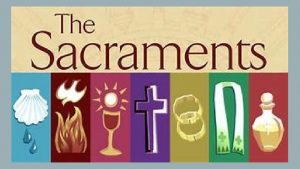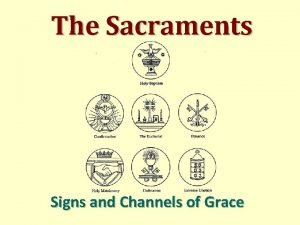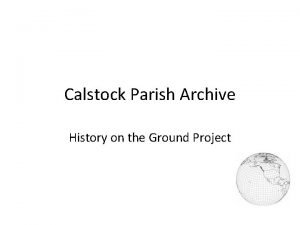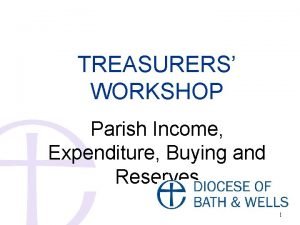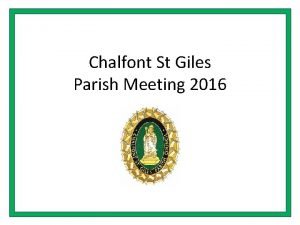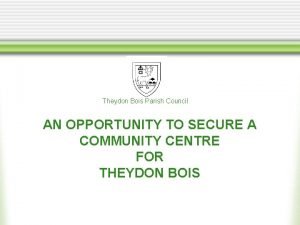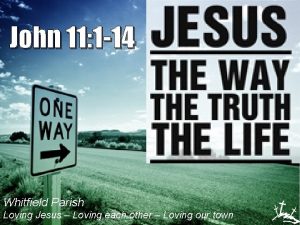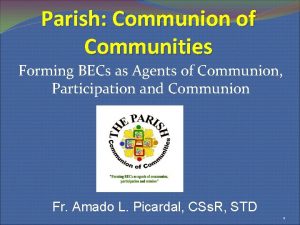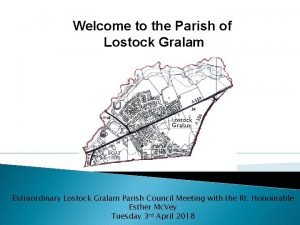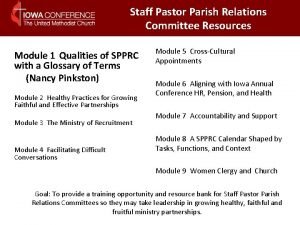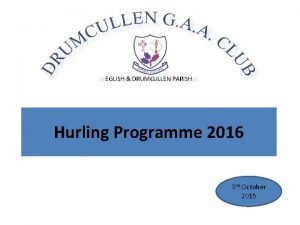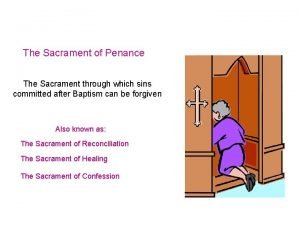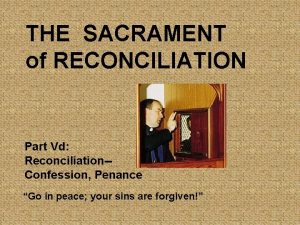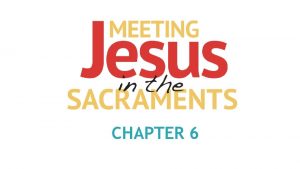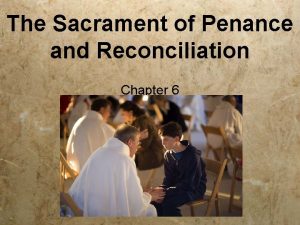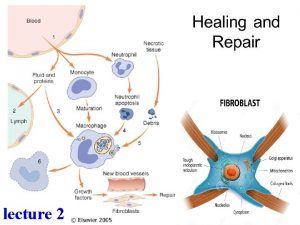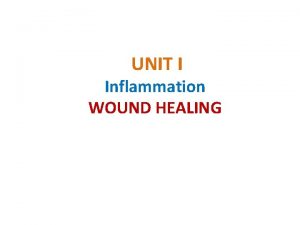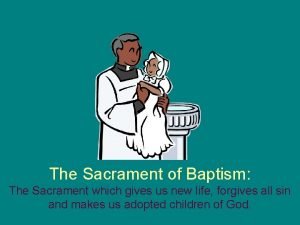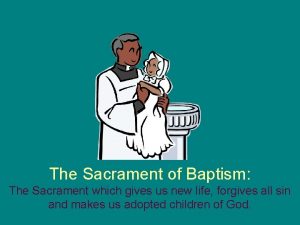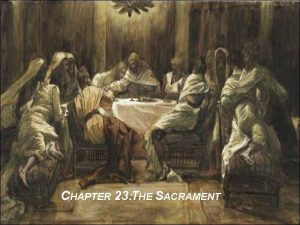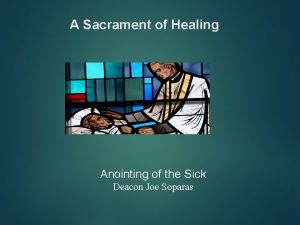1 PENANCE Sacrament of Healing A Parish Sacrament





![Scriptural references Lost Sheep [Luke 15: 4 -7] Prodigal Son [Luke 15: 11 -32] Scriptural references Lost Sheep [Luke 15: 4 -7] Prodigal Son [Luke 15: 11 -32]](https://slidetodoc.com/presentation_image_h/b80699d28b957aceb72fea9b57d33257/image-6.jpg)














- Slides: 20

1

PENANCE : Sacrament of Healing A Parish Sacrament � JESUS, SACRAMENT OF HEALING � CHURCH CONTINUES JESUS’ WORK � SACRAMENT � HEALING OF HEALTH BODY, SOUL AND SPIRIT

John 20: 19 -23 In the evening of that same day, the first day of the week, the doors were closed in the room where the disciples were, for fear of the Jews. Jesus came and stood among them. He said to them, ‘Peace be with you’, and showed them his hands and his side. The disciples were filled with joy when they saw the Lord, and he said to them again, ‘Peace be with you. ’ As the Father sent me, so am I sending you. ’ After saying this he breathed on them and said: ‘Receive the Holy Spirit. For those sins you forgive, they are forgiven; for those sins you retain, they are retained.

John (continued) And so I say to you, you are Peter, and upon this rock I will build my church, and the gates of the netherworld shall not prevail against it. I will give you the keys to the kingdom of heaven. Whatever you bind on earth shall be bound in heaven, and whatever you loose on earth shall be loosed in heaven.

OTHER SCRIPTURAL REFERENCES
![Scriptural references Lost Sheep Luke 15 4 7 Prodigal Son Luke 15 11 32 Scriptural references Lost Sheep [Luke 15: 4 -7] Prodigal Son [Luke 15: 11 -32]](https://slidetodoc.com/presentation_image_h/b80699d28b957aceb72fea9b57d33257/image-6.jpg)
Scriptural references Lost Sheep [Luke 15: 4 -7] Prodigal Son [Luke 15: 11 -32] Samaritan Woman [John 4: 5 - 26] Zacchaeus [Luke 19: 1 -10] Woman caught in Adultery [John 8: 3 -11] Good Thief [Luke 23: 39 -43]

CELEBRATING THE MERCY OF GOD One Sunday afternoon in the 1930’s in the parish in Germany where he was pastor, Fr. Bernard Haring was conducting the weekly religious instruction. This particular Sunday he was talking about Confession and began by asking the congregation: “What is the most important thing about Confession? ” A woman in the front pew immediately answered: “Telling your sins to the priest. That’s why we call it confession. ” Fr. Haring said, “Confessing your sins is important, but it’s not the most important thing. ” A man towards the back called out: “Contrition! Being sorry for your sins! The whole thing doesn’t work without contrition. ” Fr. Haring said, “That’s right, it doesn’t ‘work’ without contrition; but I don’t think that contrition is the most important thing. ” Fr. Haring wasn’t satisfied with this answer either.

Fr. Haring’s story continued A man over to the left side of church spoke up: “It’s the examination of conscience. Unless you examine your conscience, you don’t know what you have to be sorry for and you don’t know what to confess. Anybody can see that the examination of conscience is the most important thing. ” Fr. Haring wasn’t satisfied with this answer either. A young woman on the aisle tried: “It’s the penance – giving back the things you stole; unless you do the penance, it doesn’t count. ” Fr. Haring still hasn’t heard the most important thing. An uneasy silence fell over the church as people tried to think. In the silence a little girl in the third pew said: “Father, I know what’s most important. It’s what Jesus does!” Fr. Haring smiled. She had it right.

PENANCE IS THE SACRAMENT OF FORGIVENESS � It is for all those who have fallen into sin after Baptism. � Contrition is a basic component of celebrating the sacrament. � Confession of sins facilitates reconciliation. � Justice requires satisfaction/penance for sins. � The priest is a sign of God’s merciful love for the sinner. � The sacrament of Penance brings about a true restoration of the dignity and blessings of a child and friend of God.

JESUS CALLS US TO CONVERSION � Conversion is first of all a work of the greatness of God’s love through the Holy Spirit. � Conversion is both personal and social. � Conversion is of the heart and implies a change in attitude and behavior. � Conversion and repentance are accomplished in daily life.

Elements of the Sacrament � Penance - Paying Back � Confession - Owning Up � Reconciliation � Healing - Bank Balance - Healing Relationships with God, self, others, and creation.

What is the sacrament called? Ø Ø Ø It is called the sacrament of conversion because it makes sacramentally present Jesus’ call to conversion, the first step in returning to the Father (cf. Mk 1: 15; Lk 15: 18) from whom one has strayed by sin. It is called the sacrament of Penance, since it consecrates the Christian sinner’s personal and ecclesial steps of conversion, penance, and satisfaction. (CCC 1423) It is called the sacrament of confession, since the disclosure or confession of sins to a priest is an essential element of this sacrament. In a profound sense it is also a “confession” - acknowledgment and praise - of the holiness of God and of his mercy toward sinful humanity.

And more … Ø Ø It is called the sacrament of forgiveness, since by the priest’s sacramental absolution God grants the penitent ‘pardon and peace’ [Order of Penance 46: formula of absolution]. It is called the sacrament of Reconciliation, because it imparts to the sinner the love of God who reconciles: ‘Be reconciled to God’ [2 Cor. 5: 20]. He who lives by God’s merciful love is ready to respond to the Lord’s call: ‘Go; first be reconciled to your brother’ [Mt. 5: 24]. ” (CCC 1424)

SIN – AN OFFENCE AGAINST GOD AND DAMAGES RELATIONSHIPS WITH THE CHURCH AND THE WORLD � Only God forgives sin. � The Sacrament of Penance entails both God’s forgiveness and reconciliation with the Church. � The priest, on behalf of Jesus Christ, reconciles the sinner to God and the Church. � Confession to a priest is essential to the sacrament of Penance. � Confession of everyday faults is recommended by the Church.

SUBJECT MATTER OF PENANCE �Mortal Sin… destroys charity in the heart of man by a grave violation of God’s law; it turns man away from God, who is his ultimate end and his beatitude, by preferring an inferior good to him. [CCC 1855] �Venial Sin … allows charity to subsist even though it offends and wounds it. [CCC 1855]

REQUIREMENTS FOR VALIDITY �Confession of sin. �Contrition for sin. �Absolution of sin. �Satisfaction for sin.

RITE OF PENANCE Reception of Penitent. Greeting Sign of the Cross Invitation to trust in God Reading of the Word of God. Confession of Sins & Acceptance of Satisfaction. Prayer of the Penitent (Act of contrition). Absolution Proclamation of praise of God and Dismissal

WORDS OF ABSOLUTION God, the Father of mercies, through the death and resurrection of his Son has reconciled the world to himself and sent the Holy Spirit among us for the forgiveness of sins; through the ministry of the Church may God give you pardon and peace, and I absolve you from your sins in the name of the Father, and of the Son, and of the Holy Spirit. Amen.

Practice the living out of the sacrament in one’s life: Being a reconciling and forgiving person with spouse and family & community. “…when any one of us chooses to act as Jesus was known to act, we too become living sacraments in our world. When I forgive my brother or sister from my heart, I become a sacrament of forgiveness; I unveil the face of God who forgives, just as Jesus himself did. ” (Beguerie and Duchesneau, How to Understand the Sacraments) 19

20
 O sacrament most holy oh sacrament divine
O sacrament most holy oh sacrament divine Matter form and minister of marriage
Matter form and minister of marriage Form of holy orders
Form of holy orders Calstock parish archive
Calstock parish archive Parish buying
Parish buying Chalfont st giles parish council
Chalfont st giles parish council Baughurst parish council
Baughurst parish council Theydon bois parish council
Theydon bois parish council John 11:1-14
John 11:1-14 Ryarsh parish council
Ryarsh parish council Communion of communities
Communion of communities Tpss homepage
Tpss homepage Baughurst parish council
Baughurst parish council Tata lostock
Tata lostock Staff parish relations committee
Staff parish relations committee Whiteshill and ruscombe parish council
Whiteshill and ruscombe parish council Natalie parish
Natalie parish Assumption parish schools
Assumption parish schools Sutton benger parish council
Sutton benger parish council Parish hill high school
Parish hill high school Eglish drumcullen
Eglish drumcullen

